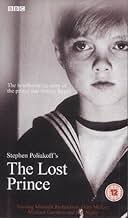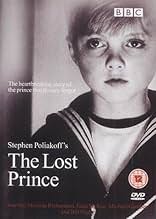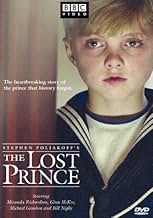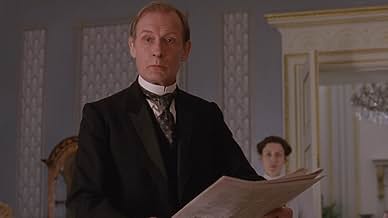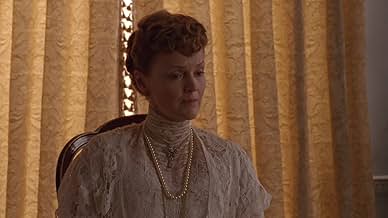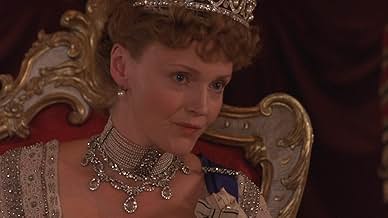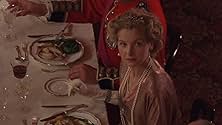AVALIAÇÃO DA IMDb
7,6/10
2,2 mil
SUA AVALIAÇÃO
Adicionar um enredo no seu idiomaThe story of Prince John, the autistic and epileptic youngest son of Queen Mary and King George V, who spent his whole life hidden away from public view and died at the age of 13 in 1919.The story of Prince John, the autistic and epileptic youngest son of Queen Mary and King George V, who spent his whole life hidden away from public view and died at the age of 13 in 1919.The story of Prince John, the autistic and epileptic youngest son of Queen Mary and King George V, who spent his whole life hidden away from public view and died at the age of 13 in 1919.
- Ganhou 3 Primetime Emmys
- 8 vitórias e 21 indicações no total
Explorar episódios
Avaliações em destaque
Stephen Poliakoff wrote and directed this which was shown over two weekends recently here in the UK. It was certainly a sumptuous production, I've rarely seen a costume drama more lavishly dressed.
It is broadly about the period 1908 to about 1920 seen through the eyes of the little known Prince John, youngest son of King George V and Queen Mary. Possibly autistic or with milder learning difficulties and known to be epileptic, this play shows his child's eye views of his grandfather the King (Edward VII) and the visit of the Tzar to the UK, following on to his own father's succession, through the Irish crisis and on to the the First World War. His father becomes King and he is packed off to the country, as his shortcomings emerge, with his faithful nurse Lala with only occasional visits from the aloof Queen Mary his mother, who just cannot understand him or his needs. His brother George, very bright and determined, is used as a foil to explain a lot of action as is the King's Secretary, Lord Stamfordham.
Miranda Richardson is superb as Queen Mary, catching her regality and vunerability in one, though Tom Hollander did less well as the King, he was a little young, the King being in his late forties/early fifties during this time, and Michael Gambon, a Poliakoff favourite (and the new Dumbledore apparently) does little more than a cameo as Edward VII. Gina McKee excels as Lala, determined to make Johnnie's parents just even notice him.
The King and Queen are here portrayed much younger than the geriatrics they are usually seen as in Abdication dramas. Great stuff!
And what became of them all, well you'll have to watch but Prince George became the Duke of Kent and was killed in an RAF aircrash in 1942, George V died in 1936 and Queen Mary died in 1953, the year Johnnie's niece, Elizabeth was crowned.
It is broadly about the period 1908 to about 1920 seen through the eyes of the little known Prince John, youngest son of King George V and Queen Mary. Possibly autistic or with milder learning difficulties and known to be epileptic, this play shows his child's eye views of his grandfather the King (Edward VII) and the visit of the Tzar to the UK, following on to his own father's succession, through the Irish crisis and on to the the First World War. His father becomes King and he is packed off to the country, as his shortcomings emerge, with his faithful nurse Lala with only occasional visits from the aloof Queen Mary his mother, who just cannot understand him or his needs. His brother George, very bright and determined, is used as a foil to explain a lot of action as is the King's Secretary, Lord Stamfordham.
Miranda Richardson is superb as Queen Mary, catching her regality and vunerability in one, though Tom Hollander did less well as the King, he was a little young, the King being in his late forties/early fifties during this time, and Michael Gambon, a Poliakoff favourite (and the new Dumbledore apparently) does little more than a cameo as Edward VII. Gina McKee excels as Lala, determined to make Johnnie's parents just even notice him.
The King and Queen are here portrayed much younger than the geriatrics they are usually seen as in Abdication dramas. Great stuff!
And what became of them all, well you'll have to watch but Prince George became the Duke of Kent and was killed in an RAF aircrash in 1942, George V died in 1936 and Queen Mary died in 1953, the year Johnnie's niece, Elizabeth was crowned.
This short drama focused on the epileptic Prince John, son of George V and Queen Mary, and brother to the present Queen Elizabeth's father, George VI.
We see the story of John from the perspectives of himself and of his nurse, Lalla (the emotionless Gina McKee). As he becomes more out of control and an embarrassment to his family, the little boy becomes more special to the viewer. Johnny is a crank but a lovable one.
Daniel Williams and Matthew Thomas both make an impact as Prince John at different ages, while Tom Hollander and Miranda Richardson are excellent as his repressed and bewildered parents. There's also key roles of interest for Bill Nighy (Stamfordham), Frank Finlay (the PM, Herbert Asquith), and David Barrass (Kaiser Bill).
Aside from the problems accorded by John's illness and confinement, we also see how events unfold in Russia for George V's cousins, the ill-fated Romanov family.
'The Lost Prince' is another winner for writer/director Stephen Poliakoff, and well worth your time. Enjoyable whether you know the story or the intricacies of the Royal family, or not.
We see the story of John from the perspectives of himself and of his nurse, Lalla (the emotionless Gina McKee). As he becomes more out of control and an embarrassment to his family, the little boy becomes more special to the viewer. Johnny is a crank but a lovable one.
Daniel Williams and Matthew Thomas both make an impact as Prince John at different ages, while Tom Hollander and Miranda Richardson are excellent as his repressed and bewildered parents. There's also key roles of interest for Bill Nighy (Stamfordham), Frank Finlay (the PM, Herbert Asquith), and David Barrass (Kaiser Bill).
Aside from the problems accorded by John's illness and confinement, we also see how events unfold in Russia for George V's cousins, the ill-fated Romanov family.
'The Lost Prince' is another winner for writer/director Stephen Poliakoff, and well worth your time. Enjoyable whether you know the story or the intricacies of the Royal family, or not.
This is a truly wonderful production with brilliant, almost surreal touches that lift this drama about the crowd.
I would love to know if any of Prince John's drawings survived. They had, or at least the ones used for the film had a Chagal-like quality that was both very graceful and artistic and filled with insite as to the inner character of the subjects. "The Tsar Swimming" and "Fat Mary" are two example. His father wearing a crown far too big for his head is a masterpiece.
I also wonder if Prince John wasn't a savant. His drawings were exceptional and far ahead of his time and his musical ability was,(if the film properly portrayed this talent)quite remarkable.
What is wonderful about this film is the sense that John despite everything managed to form his own little community on his "Estate", surrounded by people who really did love him. I also have the feeling that he was quite a happy child most of the time.
His parents were no worse than other Royal parents and a great deal better than most.
Special mention should be made of the marvelous Bibi Anderson who played Queen Alexandra so perfectly. At the funeral she even managed to look almost exactly like the Dowager Queen.
Someone mentioned that they didn't believe that the Tsar and the Tsarina would have acted as coldly toward their relations when visiting at Cowes. Unfortunately, that's just how they acted. They did believe that they were seated higher at the table of the Rulers of the World than their cousins in England who had to make-do with smaller versions of their own vast palaces in St. Petersburg. After all the Tsar was the last Absolute Monarch in the world. He even had to approve of every marriage and every divorce. No decision could be made unless he gave his approval. His cousin George had to actually deal with a rabble of advisors and that intrusive Parliment.
The scenes of the Tsar swimming were especially out of touch with reality, just as the Tsar was out of touch with the reality of his situation.
The Russian Grand Duchesses were so dream-like in their lovely summer laces and huge flower-like hats. All of John's imagined scenerios were touched with this combination of wistfullness and joy.
I mention these things because they haven't been mentioned before and they are what I will bring with me forever. Those haunting images of the children running on the beach, the flower-hats in the flower-garden and John peeking through the rails of the balcony at the beautiful lady at the banquet who smiles and waves back at him...a small and precious moment to be treasured.
See this film and fall in love with a child that refuses to be "Lost".
I would love to know if any of Prince John's drawings survived. They had, or at least the ones used for the film had a Chagal-like quality that was both very graceful and artistic and filled with insite as to the inner character of the subjects. "The Tsar Swimming" and "Fat Mary" are two example. His father wearing a crown far too big for his head is a masterpiece.
I also wonder if Prince John wasn't a savant. His drawings were exceptional and far ahead of his time and his musical ability was,(if the film properly portrayed this talent)quite remarkable.
What is wonderful about this film is the sense that John despite everything managed to form his own little community on his "Estate", surrounded by people who really did love him. I also have the feeling that he was quite a happy child most of the time.
His parents were no worse than other Royal parents and a great deal better than most.
Special mention should be made of the marvelous Bibi Anderson who played Queen Alexandra so perfectly. At the funeral she even managed to look almost exactly like the Dowager Queen.
Someone mentioned that they didn't believe that the Tsar and the Tsarina would have acted as coldly toward their relations when visiting at Cowes. Unfortunately, that's just how they acted. They did believe that they were seated higher at the table of the Rulers of the World than their cousins in England who had to make-do with smaller versions of their own vast palaces in St. Petersburg. After all the Tsar was the last Absolute Monarch in the world. He even had to approve of every marriage and every divorce. No decision could be made unless he gave his approval. His cousin George had to actually deal with a rabble of advisors and that intrusive Parliment.
The scenes of the Tsar swimming were especially out of touch with reality, just as the Tsar was out of touch with the reality of his situation.
The Russian Grand Duchesses were so dream-like in their lovely summer laces and huge flower-like hats. All of John's imagined scenerios were touched with this combination of wistfullness and joy.
I mention these things because they haven't been mentioned before and they are what I will bring with me forever. Those haunting images of the children running on the beach, the flower-hats in the flower-garden and John peeking through the rails of the balcony at the beautiful lady at the banquet who smiles and waves back at him...a small and precious moment to be treasured.
See this film and fall in love with a child that refuses to be "Lost".
Prince John, youngest son of George V and Queen Mary, was handicapped by learning difficulties and the epilepsy which eventually killed him at 14. He spent most of his life hidden away on the Sandringham estate, but he was well cared for and not entirely forgotten by his family (he appeared with his brothers and sisters on a Newfoundland stamp issue). Stephen Poliakof has taken this sad story and created a wonderful tale of growing up in a royal family who, far from ruling their roost, were hidebound by convention, slaves to 'appearances' and emotionally crippled. John, however, is virtually free from all of this as his brother George remarks 'he is the happiest of us all' (or words to that effect).
John and George (later the Duke of Kent) are able to observe some notable historic personalities and moments. When their grandfather Edward VII (Michael Gambon) dies, most of Europe's royalty turn up to the funeral. George, on chatting terms with Lord Stamfordham (Bill Nighy), his father's private secretary, follows the diplomatic descent into World War I. And there is the fate of cousin Nicky, Tsar of Russia, and his family, at the hands of the Bolsheviks. We see these events from the child's viewpoint, or rather from the viewpoints of two rather different, though close, children. This gives a sort of dreamy immediacy to the story, unadorned with explanations.
While his mother Queen Mary (Miranda Richardson) is both physically and emotionally distant, John is given plenty of love and affection by his nurse Lalla (Gina McKee). Despite his disabilities he thrives under her care to an extent his parents find overwhelming.
It's hard to tell how much of the story is based on fact and how much on Poliakoff's imagination, but it scarcely matters. He has created a story which actually evokes sympathy for royalty, a major achievement in this republican age. Prince John, the royal refusenik, leading his band of retainers across the landscape, is an evocative sight.
The settings are gorgeous, though none of the real places (Sandringham, Buckingham palace) is used. The acting is all first-rate; Tom Hollander's earnest George V and Miranda Richardson's stern but not totally unfeeling Queen Mary stand out, along with the boys playing the two princes.
John and George (later the Duke of Kent) are able to observe some notable historic personalities and moments. When their grandfather Edward VII (Michael Gambon) dies, most of Europe's royalty turn up to the funeral. George, on chatting terms with Lord Stamfordham (Bill Nighy), his father's private secretary, follows the diplomatic descent into World War I. And there is the fate of cousin Nicky, Tsar of Russia, and his family, at the hands of the Bolsheviks. We see these events from the child's viewpoint, or rather from the viewpoints of two rather different, though close, children. This gives a sort of dreamy immediacy to the story, unadorned with explanations.
While his mother Queen Mary (Miranda Richardson) is both physically and emotionally distant, John is given plenty of love and affection by his nurse Lalla (Gina McKee). Despite his disabilities he thrives under her care to an extent his parents find overwhelming.
It's hard to tell how much of the story is based on fact and how much on Poliakoff's imagination, but it scarcely matters. He has created a story which actually evokes sympathy for royalty, a major achievement in this republican age. Prince John, the royal refusenik, leading his band of retainers across the landscape, is an evocative sight.
The settings are gorgeous, though none of the real places (Sandringham, Buckingham palace) is used. The acting is all first-rate; Tom Hollander's earnest George V and Miranda Richardson's stern but not totally unfeeling Queen Mary stand out, along with the boys playing the two princes.
BBC1's 'The Lost Prince' is one of the best television dramas that the channel has shown for a long time. The story of King George V's youngest son, Johnnie, the programme explores the boy's learning difficulties and his autism-related problems, as well as the horrors of war as seen through the eyes of the Royal family.
Those are the facts, but the drama is so much more than a re-telling of a royal story. Moments of poignancy, such as Johnnie's frank but heartbreaking honesty with his parents, are touching without becoming schmaltzy or obvious, and the harsh burden of the First World War on the British keeps the drama well within reality.
Good performances all around, particularly from Miranda Richardson as Queen Mary and Tom Hollander as King George, who invoke sympathy from their seemingly impassive facades. Bill Nighy is excellent as the King's adviser, Stamfordham, and the children - especially Rollo Weeks -are more than capable of carrying such a difficult and weighty subject.
Those are the facts, but the drama is so much more than a re-telling of a royal story. Moments of poignancy, such as Johnnie's frank but heartbreaking honesty with his parents, are touching without becoming schmaltzy or obvious, and the harsh burden of the First World War on the British keeps the drama well within reality.
Good performances all around, particularly from Miranda Richardson as Queen Mary and Tom Hollander as King George, who invoke sympathy from their seemingly impassive facades. Bill Nighy is excellent as the King's adviser, Stamfordham, and the children - especially Rollo Weeks -are more than capable of carrying such a difficult and weighty subject.
Você sabia?
- CuriosidadesKing George V had six children, two of whom used the name George. His second son was Prince Albert Frederick Arthur George, known to the family as Bertie, who became King George VI. He had a bad stutter that began in early childhood and lasted into adulthood. His third son, Johnnie's closest sibling in this movie, was Prince George, Duke of Kent. He grew up to live a life that was considered scandalous, and died in a plane crash in 1942.
- Erros de gravaçãoWhen the Romanovs are in England, Alexandra speaks English with a Russian accent. In real life, Alexandra was a German princess raised in England by her grandmother, Queen Victoria. She spoke English with a British accent.
- Citações
Prince George: [Speaking about Prince John] He was the only one of us who was able to be himself.
- ConexõesFeatured in Masterpiece Theatre: The Lost Prince: Part 1 (2004)
- Trilhas sonorasRondo for Glass Armonica
(uncredited)
Composed by Joseph Schmittbauer (as J.A. Schmittbauer)
(Queen Alexandra's birthday cake)
Principais escolhas
Faça login para avaliar e ver a lista de recomendações personalizadas
Detalhes
- Data de lançamento
- Países de origem
- Centrais de atendimento oficiais
- Idioma
- Também conhecido como
- 失落的王子
- Locações de filme
- Black Park Country Park, Black Park Road, Wexham, Buckinghamshire, Inglaterra, Reino Unido(Russian lake, royal car)
- Empresas de produção
- Consulte mais créditos da empresa na IMDbPro
Contribua para esta página
Sugerir uma alteração ou adicionar conteúdo ausente

